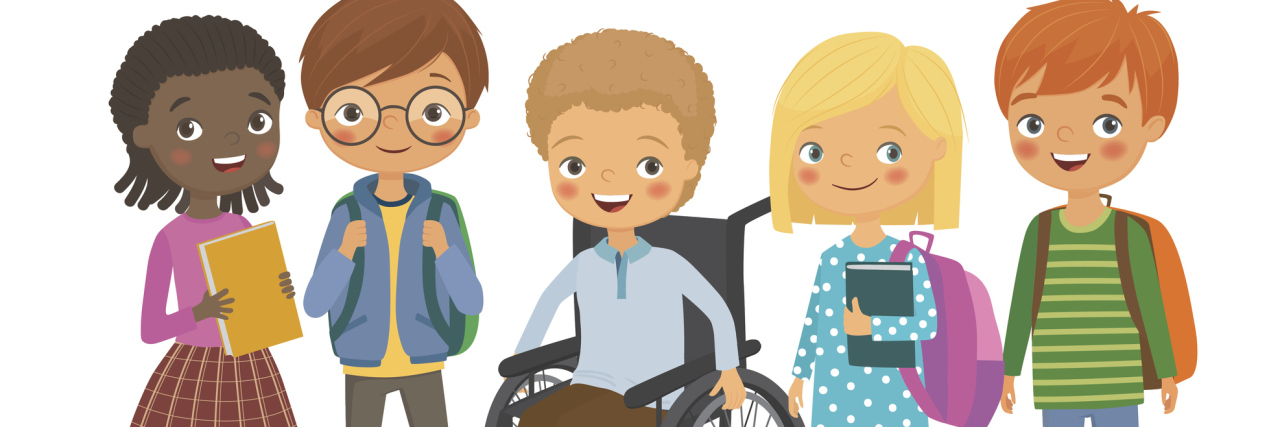“Can I have a sticker for my little sister, too? She’s right there, her name is E, and she’s 3. She walks funny… I think her right arm and leg are messed up or something.”
I feel the blood leave my face as I look up from my wallet and make eye contact with the cashier. I feel the fingers of my 3-year-old tug at my shorts as she attempts to stabilize her balance, fighting the tension of her muscles. Thankfully, the cashier simply smiles and hands my 5-year-old another sticker, simply saying, “That’s nice of you to take such great care of your little sister.”
I can’t help but ponder on this moment the entire way back to the car — this is our life.
My daughters are both full of fire, bright, and each unique. They are constantly inquisitive, often trying to listen to adult conversations to gain insight into the world. A mere 22 months apart, my daughters are very much “thick as thieves” and spend a majority of their time outside of school together. It also just so happens that my younger daughter, E, has spastic hemiplegic cerebral palsy.
Although there have always been differences between my two daughters, I spent the first two years of E’s life chalking the slight developmental delays and mild motor impairments up to her being the baby of the family. E has always been a cuddle bug, more cautious than her sister, and more inclined to look for reassurance or observe others. I assumed, as most parents do, that she would eventually just “grow out of it.”
As we work through this process of diagnosis and early intervention, our older daughter is hanging onto every word and quickly discovering that her sister is unique. As a parent, this means I am not only navigating the quite complicated world of parenting a child who has cerebral palsy, but I am also needing to travel the path of educating a young child on people with disabilities.
There are three important aspects that all parents need to be mindfully aware regarding how they handle people with disabilities and how they educate their children.
1. Parents need to be aware of the language they use when discussing people with disabilities in the presence of their children.
This is a very complicated task, but probably the most important one. Our children are constantly learning from the world around them, especially from their parents. Parents need to be role models for their children not only in what they say regarding people with disabilities, but also how they act around a person with a disability. I must be careful in how I describe E’s gait, her coordination differences, and any other aspects of her condition when talking to her medical team, her preschool teachers, and even family and friends. My husband and I are also very mindful of how we discuss people with disabilities that we meet in public and we encourage our daughters to always treat people equally, and that if they want to know more information, it is OK to introduce themselves and politely ask people questions regarding their conditions.
2. Parents need to take time to talk to their children about people with disabilities.
This is something I do not feel parents do enough, and certainly not something my parents discussed with me as a child. Take time to read stories, have conversations, and point out signs or devices in public. We recently had a great conversation at a restaurant regarding the marking on the tables identifying accessibility for people who use wheelchairs. It allowed an opportunity to educate our children and clear up some questions our oldest daughter had regarding the use of wheelchairs. I plan to continue to find any chance I can to educate my daughters (especially my oldest, who needs to understand for her sister’s sake). I also hope that by educating my own children, I may aid in the education of other children as my children share their knowledge.
3. Parents of children with disabilities need to allow their child with a disability to make decisions regarding how they are addressed and what is shared.
I have already decided that E will be the one who decides if she wants person first or identity first language because, after all, it is her life, not mine. I also want the decision of sharing about her disability to be her choice. She may choose to be completely open with people about having cerebral palsy, or she may want to avoid telling her friends at school. The important thing is giving her the freedom to choose what is disclosed. I think these conversations will be important to have as soon as she is old enough to comprehend, and she can always change these decisions as she matures. I firmly believe that the most important thing I can do as a parent for my child is respect her and help her any way that I can in being comfortable in her skin. I think that often, as parents, we desire to protect and shelter our children, but sometimes the choices we make in hopes of protection are not actually in the child’s best interests. I want to keep this in mind as I raise both of daughters, not just my child who has CP.
There may be more moments like the recent incident at the checkout line. There may be times where we enter restaurants and people stare at my child, especially if she is having a particularly “spastic” day. I hope, though, that I can be a voice of progress towards change for the disability community. I hope that I can spread awareness and education through my words, through my writing. Most of all, though, I hope that, as E’s mother, I can provide only the best for her and teach her to love herself, cerebral palsy and all.
Getty image by MarinaMays

